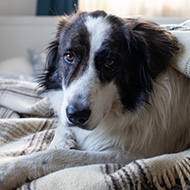Scottish SPCA releases 2022 statistics

More than three times as many people called to give up their pet than in 2021.
The Scottish SPCA has released its figures for 2022, highlighting what the charity calls 'one of the most challenging years' in its history.
Over the course of the year, the SSPCA animal helpline took over a quarter of a million calls (252,265), with over 4,000 calling specifically to give up their pet, with the majority of these saying that financial issues were their key issues.
Kirsteen Campbell, chief executive of the Scottish SPCA, commented: “Through our animal helpline and inspectors, the Scottish SPCA has a unique insight into the impact of the cost-of-living crisis on people and their pets.
“Last year we saw first-hand how people were having to choose between feeding themselves or their animal, or making the heart-breaking decision to give their pet up.
“Prevention is in our name and Pet Aid allows us to prevent suffering by not only providing food and supplies to those who need it, instead of picking up the pieces after things have gone wrong.
“The best thing for animal welfare is to keep a human and a pet together, and that’s what our overriding ambition is through this crisis.”
Throughout 2022, the organisation's animal rescue officers and inspectors responded to 86,078 reports, adding up to 235 cases per day.
The charity's National Wildlife Rescue Centre treated 4,908 wild animals, and the rescue and rehoming centres rehomed 3,434 animals.
Advocating against organised crime in animal welfare in Scotland, the Scottish SPCA launched 124 investigations into the puppy trade, 52 investigations into illegal ear cropping of dogs and 72 probes into animal fighting and badger baiting in 2022.
Kirsteen continued: “Sadly, there are those out there who can and do exploit animals for their own gain. Our Special Investigations Unit is at the forefront of the fight against these people, and has ensured a number of them face justice through unparalleled case work.”



 BSAVA is to partner with BVA Live (11-12 June 2026) to champion clinical research.
BSAVA is to partner with BVA Live (11-12 June 2026) to champion clinical research.